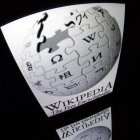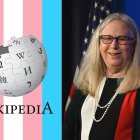Wokepedia: Is the world's largest online encyclopedia politically biased?
Progressive funding donations, a tightly controlled foundation and conflicts between editors raise questions about the reliability of the world's fourth-largest website.

The online encyclopaedia is yet another arena in the cultural battle
It's hard to say when in its history Wikipedia became what it is today. The world's largest online encyclopedia exemplifies the rapid advancements in society. However, it now resembles a sort of Orwellian authority, dictating what is considered true and what is not.
However, more and more doubts are being raised about Wikipedia's legitimacy for that role. In particular, questions arise regarding whether the web portal created by Larry Sanger and Jimmy Wales in 2001, still upholds the fundamental principles of objectivity and decentralization that originally motivated its founding.
Co-founder speaks out against propagandism
Red flags were raised in 2021 when one of Wikipedia's founders, Larry Sanger, admitted that the information that appeared on the site was no longer reliable. Sanger claimed that Wikipedia was now just "propaganda."
At the time, Sanger emphasized that his project had turned into a platform that marginalized conservative viewpoints. "You can't quote Fox News on sociopolitical issues. It's now banned," the founder stated in an interview with Unherd.
What Sanger pointed out was later corroborated by analyses by the Manhattan Institute, which found a clear left-wing bias in Wikipedia articles, despite the expectation that they should be neutral.
According to the Manhattan Institute's findings, right-wing figures and ideas associated with the right are nearly always presented with a negative connotation in Wikipedia articles.
Using computational content analysis with a broad language model for content annotation, the report reveals that terms associated with a right-wing political stance are more frequently linked to emotions of anger and disgust compared to those suggesting a left-wing stance.
Conversely, terms associated with a left-wing ideology are more frequently associated with joy than right-wing terms. The Manhattan Institute believes that Wikipedia is not fully complying with its policy of viewpoint neutrality.
The bias highlighted in the report extends from individuals to specific terms and words. For example, on a scale where 0 represents neutrality and negative numbers represent negative connotations, terms used to define the radical left receive significantly better scores than those for the right. Wikipedia often uses "radical left" or "far left" with an almost neutral connotation. However, the terms "radical right" or "right-winger" are frequently employed in negatively charged phrases, making them derogatory.
The same is true for U.S. congressmen or presidents. The three presidents with the highest positivity scores in their Wikipedia articles, paragraphs or sentences are all Democrats.
The danger posed by these biases may be greater than initially pereived. The Manhattan Institute warns that Wikipedia's political bias could infiltrate and shape widely used Artificial Intelligence systems. Wikipedia currently allows AI applications to use its content for training, significantly influencing their computations and processes.
An increasingly less decentralized structure
The diminishing nuances in Wikipedia articles are not the only thing causing the left-wing political bias in the online encyclopedia. The platform's policies would be increasingly stringent regarding the use of unverified sources to support certain claims, enabling editors to modify articles. This trend is attributed to the growing influence of the non-profit foundation that runs Wikipedia, the Wikimedia Foundation.
Originally, Wikipedia was designed to be a free and open encyclopedia where any internet user could contribute and edit its content. A number of mechanisms were designed to prevent so-called "vandalism." This concept continues to exist to some extent.
The site has a hierarchy among users, differentiating them by roles and permissions. The lowest-tier Wikipedia users are only allowed to edit articles that have not been vetoed. Once users create and verify their accounts and meet a series of minimum requirements over time, they become Wikipedia editors. These individuals are members of a community committed to editing and creating encyclopedia entries. In a sense, they view themselves, and their community, as the librarians and archivists of the new digital age.
Above these editors are the administrators. They are community members who, after demonstrating experience, expertise and commitment, submit a nomination to the community for additional permissions. In Wikipedia community circles, they are influential figures who command a certain authority. Administrators can remove and restore articles, lift editing restrictions on specific entries, block and unblock misbehaving users as well as guide discussions that occur behind the scenes of articles. Above the editors, there are a number of said bureaucratic roles responsible for management and permissions, all of which are elected by the community.
With this system, how is it possible that there is coordinated political bias with the progressive agenda ? The answer lies with the Wikimedia Foundation.
A foundation to control everything
The Wikimedia Foundation, which presents itself as a non-profit organization, is aligned with powerful political and business interests, particularly those associated with progressive or left-wing ideologies. According to specialist journalist Ashley Rindsberg, this alignment influences the platform's editorial decisions and guidelines.
The Foundation itself is governed by a board of trustees, which includes representatives from the Wikimedia community, as well as outsiders with expertise in law, technology and philanthropy. This governance structure, along with external funding sources, allows them to subtly influence content, favoring dominant and progressive views. For example, they modify and alter data verification policies and the requirements for a source to be considered reliable, all with politically biased intentions.
The Foundation receives donations from individuals, technology companies, and philanthropic organizations, some of which may have political interests that influence Wikipedia's overall direction.
Among the large donors, indirect and direct, are companies with progressive agendas such as Google or Apple, as well as less transparent sources such as the leftist mega-fund Tides Foundation. This $800 million fund is part of the broader Tides Center, a network "that partners with social change leaders and organizations to...accelerate social justice." The Tides Foundation's IRS 990 lists its mission as "Grantmaking through funds to accelerate the pace of social change."
A constant battle
Entries of controversial topics, such as transgender issues or politics, often serve as battlegrounds for different factions within the Wikipedia community. To gain further insight into this ecosystem, VOZ interviewed a Wikipedia editor who goes by the pseudonym C-3PO, named after the Star Wars droid known for handling data on a wide range of topics throughout the galaxy.
"It's all about clans. There are factions, it's as simple as that. And they organize themselves to deal with the issues that affect them most directly. This sectarianism doesn't help at any time to make Wikipedia more objective, because in the end everyone has an agenda or an inclination," said the editor, who prefers not to reveal which group he belongs to. What C-3PO discussed is echoed by Ashley Rindsberg, who mentions a faction known as "Women in Red." This group aims to enhance the visibility of women on Wikipedia and increase female representation in editing and leadership positions within the community. As a faction with a clear objective, they align themselves with political ideals beyond mere information. While this group is public and somewhat transparent, many others operate with less visibility.
"Editors meet in discussion channels and often have some sort of hierarchy. They maintain their internal forums through applications like Discord. Many of them know each other and have personal relationships with each other. It's mostly a function of the language they speak, but many groups cross that barrier," said the editor, who explained that some of these groups have varying degrees of relationships with the Wikimedia Foundation and its permanent, paid staff responsible for managing the platform.
The editor explained that Wikipedia entries with words such as "woman" are a constant "battleground" between progressive and more neutral factions. "It's like a schoolyard, and it's worth the dirty punches. When the administrators veto participation in a controversial post, the only way to gain access for editing is to establish a rapport and affinity with them."
For journalist Ashley Rindsberg and many others in the Wikipedia community, Katherine Maher's leadership at the Wikimedia Foundation marks a turning point in understanding what the encyclopedia has become today.
This executive, who specializes in running nonprofit organizations, comes from an explicitly progressive background with ties to the Democratic Party. In fact, after her time at the Wikimedia Foundation, Mager became the head of the public radio network NPR, which was recently accused of going through its most sectarian era.
Mahe promoted the Movement Strategy, also known as Wikimedia 2030. This reorganization aims to turn Wikipedia into an activist space for Social Justice and DEI policies, instead of neutral knowledge. This is quite the opposite of the encyclopedia's first mission.
With all this in mind, it is clear that Wikipedia poses more dangers than the general public may realize. Once regarded as a reputable resource, the page has become the fourth most visited website in the world, now sereving as yet another battleground for cultural conflict and the establishment's unique narrative.


























